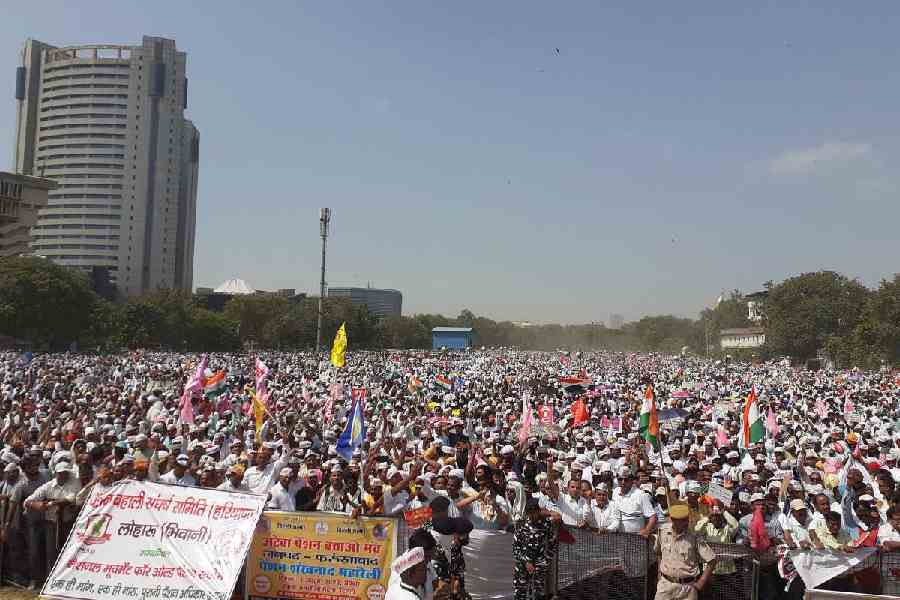Thousands of central and state government employees from across the country gathered at the Ramlila Maidan here on Sunday to demand the restoration of the Old Pension Scheme, with several opposition parties also extending support to the protesters.
Opposition leaders including AAP Rajya Sabha MP Sanjay Singh, former Haryana chief minister Bhupinder Singh Hooda and his Congress colleagues Arvinder Singh Lovely, Sandeep Dikshit and Udit Raj, and Bahujan Samaj Party MP Shyam Singh Yadav, besides farmer leader Rakesh Tikait, joined the rally.
The protesters who had gathered under the banner of the Joint Forum for Restoration of Old Pension Scheme (JFROPS) and National Joint Council of Action (NJCA) said they were worried about their post-retirement future.
"The employees who joined government service after January 1, 2004 are strongly opposing the New Pension Scheme. They are worried about their future after retirement because they have been deprived of the Old Pension Scheme and forced into the New Pension Scheme," said Shiv Gopal Mishra, National Convener and General Secretary of All India Railway Men's Federation.
At the maha rally, the organisers claimed that government employees from 20 states were participating in the rally. The protesters said that the party which promises to restore the Old Pension Scheme should be voted to power in the 2024 Lok Sabha polls.
Holding placards and flags, the protesters raised slogans of 'Inquilab Zindabad' and 'Karamchari Ekta Zindabad'.
"We had given a call to bring back the Old Pension Scheme (OPS) and we had successfully brought back the OPS in several states with our struggle.
"Our team believed that if the central government ratifies this (OPS), then the onus won’t be on the state government. This is why we had come to Delhi’s Ramlila Maidan (to protest),” National Movement For Old Pension Scheme (NMOPS) leader Vijay Kumar Bandhu, told PTI Video.
Noting that Congress-ruled states have restored OPS, Chhattisgarh Chief Minister Bhupesh Baghel and other party leaders said as soon its government is formed at the Centre, it will implement OPS in the entire country.
"These OPS protests show the anger of our steel frame, the government officers, against the ruling regime," AICC general secretary, organisation, K C Venugopal said.
"We implemented OPS in Congress-ruled states because it is their right. This crowd of 20 lakh people tells a story - the BJP's days are numbered," Venugopal said on X.
At the rally, while Tikait assured the protesters that the farmers were with them, AAP's Sanjay Singh said that he has always raised the issue of the old pension scheme in the Parliament.
"On this stage, Chief Minister Arvind Kejriwal had promised to implement the Old Pension Scheme. A resolution was passed in the Delhi Legislative Assembly on the matter while the Punjab government took a cabinet decision to implement it.
"Only Kejriwal gives guarantees and does not make false promises. I have always raised your issues in the Parliament.
"I am suspended right now but I assure you whenever I will return to the House, I will raise your issues. An MLA or MP gets a pension even if elected for 40 days and our government employees who have worked for 40 years will not get a pension," he asked.
Raj said that if the Congress comes to power at the Centre, the Old Pension Scheme will be implemented on the first day itself.
He said the party had implemented the OPS in Chhatisgarh, Himachal Pradesh and Rajasthan where it had governments.
Taking to X, Delhi Chief Minister Arvind Kejriwal voiced support for the Old Pension Scheme and said he has requested the Centre to implement it for Delhi government employees.
"We strongly support the demand of govt employees to bring back OPS. NPS is an injustice against employees. We have implemented OPS in Punjab and have written to the Centre for implementing it for Del govt employees. Some other non-BJP govts have also implemented OPS," Kejriwal said in a post on 'X'.
Under the OPS, a government employee gets a monthly pension equivalent to 50 per cent his/her last drawn salary. There was no need for contribution by employees.
Under the NPS, a state government employee contributes 10 per cent of his/her basic salary plus dearness allowance with the state making a matching contribution.
The money is then invested in one of the several pension funds approved by the Pension Fund Regulatory and Development Authority and returns are market-linked.
Except for the headline, this story has not been edited by The Telegraph Online staff and has been published from a syndicated feed.










